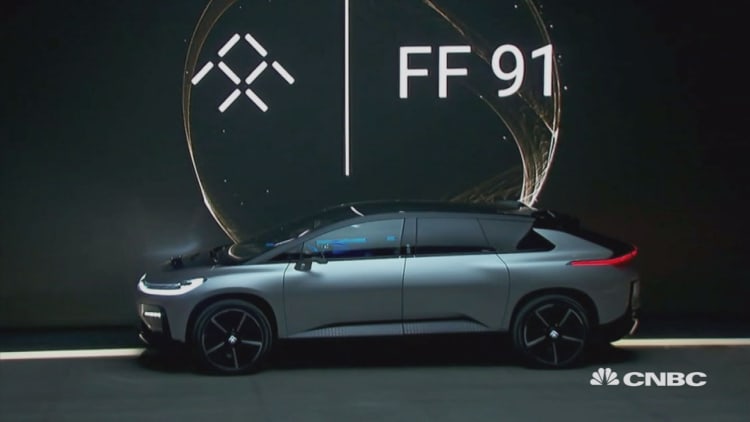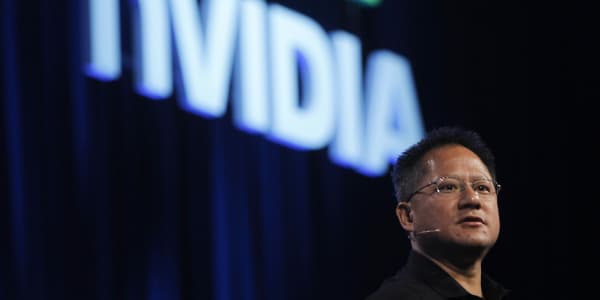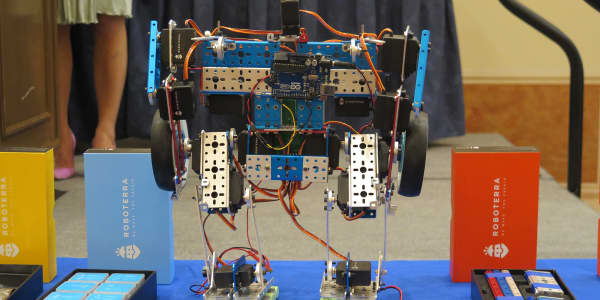
A car that seems straight out of a James Bond film, outpacing a Bentley, Tesla or Ferrari, speeds through videos posted by little-known carmaker Faraday Future.
Whether the embattled company lives up to those clips may be the make or break story of CES this year.
The company has hitched its future to a demo in Las Vegas on Tuesday, even as critics say the company is crumbling, In CES-themed tweets, Faraday Future, known as FF, touts a car that can "defy gravity," and is "the quickest production car in the world." A clock on its website counts down to CES' 6 p.m. PT reveal.
FF has called out critics, tweeting that "skepticism and negativity only strengthens our conviction."
FF's bravado comes after damaging headlines have claimed that the company is "on the brink of collapse," as its Chinese backer, LeEco, faces a shortage of cash. LeEco executive Jia Yueting visited FF on Dec.17 to give "an inspirational speech," according to FF's Twitter feed.
Jia said in a letter last month that LeEco was facing "big company disease," and as of this week, it was said to be seeking investors of its own. LeEco's own self-driving car had a rocky debut.

On Thursday, The Verge reported that Faraday Future's global CEO, LeEco co-founder Ding Lei, had stepped down.
"If they don't find money after CES," a former executive told The Verge, "they will be out of money by February."
CNBC has reached out to FF and LeEco for comment, but did not immediately receive a response.
When the secretive company surfaced in 2015, FF promised to bring a car to market this year with "no internal combustion parts whatsoever," according to Motor Trend. At last year's CES, the company failed to produce a production-ready car, presenting instead an "amped up" prototype and a virtual reality simulation of a car.
The car market has learned to look past the cool styles of prototype vehicles, said Daniel Newman, principal analyst and founding partner of Futurum Research. But if FF ends up offering custom-built cars — a likely scenario without a widespread manufacturing and distribution setup — Newman said virtual reality could be a key differentiation for the company.
"When you're buying something, people want to experience it. Could they use virtual reality test drives?" Newman said. "For a long time you've seen 3-D-rendering where you could build your own car. It looks kind of like the car but, how could [FF] use this technology to improve their buyers' journey?"
Still, custom cars mean competing for the highest sliver of the market — and that means competing for affluent buyers who are afforded every option available, Newman said. Many carmakers, from traditional players to Tesla, start new products in the upper-price range, said Michael Dempsey, a venture partner at Compound, where he focuses on frontier technology.
Since FF emerged, so have multiple rivals, from BlackBerry to BMW. Tesla will have a competing event in Reno on Wednesday, Bloomberg reported.
With small-scale production, FF isn't likely to be first to the market with only one innovation, Newman said. But a knock-out combination of long-range driving time and autonomous driving technology could put FF over the top, said Dempsey.
"I don't really know what they could release other than a fully autonomous car with 500-mile range," Dempsey said. "I think if they can show that they can manufacture a vehicle that's on par with Tesla at less than $100,000, then that would be enough. I don't know that it's possible."
Both LeEco and FF have said their cars were as much an automobile as a platform.
"I think it's huge that [FF] can provide the market with some visibility," Newman said. "Back when they first started, they were talking about accessible demand — Airbnb for cool electric vehicles."
LeEco's expansion into the U.S. has been held up as a emblem of the growing trend toward Chinese technology investing in the U.S. But that means Faraday Future also must live in the shadow of Fisker Automotive, a similar company that sold its assets to China's Wanxiang after it filed for bankruptcy.
Still, if it has good enough software, FF might still find a buyer with either a big technology company, a foreign billionaire, or less likely, a car company, Dempsey said.
"The issue is, U.S.-based investors will have a hard time putting money into this because there's a lot that they don't know," Dempsey said. "[LeEco's involvement] makes it difficult where the capital starts and ends."
Still, Newman said, it's hard to know where there's room in the market for the kind of cars FF describes.
"Is it big innovation or big hype? If they just [do] more of the same with a PR machine, I think they're going to hit the wall," Newman said. "If we, as analysts, can't predict what they end up unveiling, then it's game changing."





